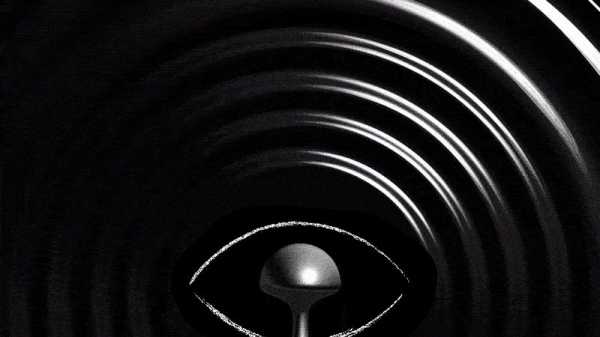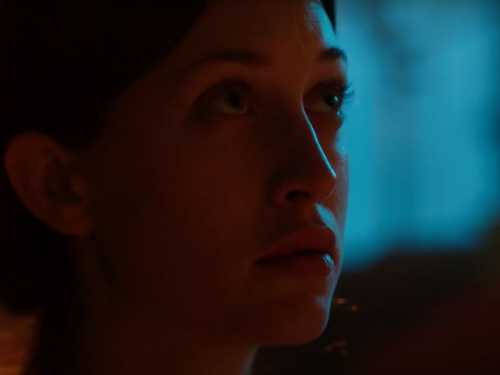
One day in the spring of 2020, when my son Renzo was a few months old, I decided that it would be a good idea to play him some death metal. You’re encouraged to read to your children, to introduce them to a wide array of foods, and I thought exposing him to different kinds of music was probably a good idea, too. Death metal can be an acquired taste.
Renzo could sit up at this point, but he was still a little wobbly. I placed a pillow behind him and put on some Morbid Angel. I took a little video of him listening to “Immortal Rites,” the opening track from the 1989 album “Altars of Madness.” Renzo is wearing a purple-and-blue tie-dye onesie, which is not really the correct attire for listening to metal. Trying to balance his head, he looks like he is nodding along to the music. He doesn’t erupt with joy, but he’s largely unbothered by the furious guitar solos and guttural vocals. Not yet a convert, but seemingly open to further explorations.
During the next year of his life, as he grew, Renzo expressed musical opinions of his own that were more in line with his young age. He was beyond delighted to hear the viral TikTok song “Laxed (Siren Beat),” by Jawsh 685, played on repeat. The song is a deeply annoying earworm that sounds like a preset on a toy synthesizer. More endearingly, he wiggled happily to the 1978 disco hit “Keep on Jumpin’.” My wife, Allegra, and I have a video of him, closer to a year old, on my shoulders, now able to sit up straight with no problem, clapping and smiling, while the singers compel you to “keep on jumpin’, let your body fly.”
The last song that Renzo really loved before he died suddenly, at twenty-two months old, was Dua Lipa’s “Levitating.” I loved it, too. I was late to participate in the global worship of the pop star, but “Levitating” eventually became a hit in our house. Maybe he liked the bubbly little beat. Or just maybe he liked the idea of levitation as a metaphor for love. At the time, a few months before he would have turned two, Renzo was really starting to grasp language. Listening to him speak, to say the names of colors (“yayow”), made me melt. In day care, he was learning Spanish. Instead of asking to hold hands, he said mano. So it probably wasn’t the song’s message, technically, that moved him. But, spiritually, I think he got it.
Pain and music have always shaped my own life. When I was a teen-ager, in the mid-nineties, living in Connecticut, I found myself in a lot of physical pain, having been diagnosed with ulcerative colitis and soon having my colon removed. My body became a sunken vessel housing my mind. I did my best to sublimate the pain. That involved taping shows off the Wesleyan radio station and buying books about punk rock and hardcore music at Barnes & Noble. I tried to hear as much underground music as I could. Some of the songs I loved were fuelled on rage, such as Negative Approach’s “Ready to Fight”: “We won’t take any shit, and we’re not about to leave / Just ’cause you don’t like who and what we want to be / Who are you to say what’s wrong, what’s right / If it’s what it takes, we’re ready to fight.” The singer sounded like he was foaming at the mouth. I was stuck in bed, but I felt like I was on fire. Someone screaming helped. But other music offered a more incandescent depth of feeling. I discovered Sonic Youth, a New York City avant-garde quartet who blended beauty into their squalls of sound. I loved Hole’s “Live Through This,” Courtney Love’s album about survival. Music began to take on the outsized importance in my life that remains nearly thirty years later.
I think, sometimes, maybe tongue in cheek or maybe not, that while listening to music I had bouts of Stendhal syndrome, the condition of dizziness, increased heart rate, and confusion felt after exposure to great art. It’s named after a guy, Stendhal, who battled dizzy spells—among other symptoms—after being deeply overwhelmed by the art of Florence in the early eighteen-hundreds. Well, one man’s Negative Approach is another’s Botticelli. I’ve pretty much had Stendhal syndrome every day of my life, but as a teen-ager especially: everything was the best music I’d ever heard, an escape hatch to possibility beyond my four walls.
When I discovered Black Flag’s music, along with the writing of its lead singer, Henry Rollins, I found the sherpa I’d sought. Rollins was handsome, muscular, charismatic, and pissed. He yelled, too, but his roar felt like a way through the pain, not a product of it. From Black Flag’s 1981 album, “Damaged,” the thesis was growled out: “Depression’s got a hold of me / Depression’s gonna kill me.” But it didn’t. Rollins lived, as did I. His resilience became a model for my own. For him, isolation and adversity were commonplace, but so were all efforts to overcome. When Renzo was born, we gave him the middle name Rollins, for a bit of punch.
When Renzo died, I wrote to Henry Rollins. I wanted him to know that my son had existed. Had lived a happy life. I sent him a photo of Renzo sitting in his high chair, holding an album by the jazz musician Don Cherry. Renzo is looking at the camera a moment after gazing at the portrait of the trumpet player. “Beautiful boy,” Rollins wrote back.
Renzo was a good sleeper, but occasionally he’d cry out in the night, as he did when he had an aneurysm. Allegra went to him in the next room, lifted him out of the crib, not yet knowing what had happened. We figured that he was cranky from teething. But he was unable to be woken. I yelled in his ear, “Renzo!” Allegra said that I should be quiet; she didn’t want to scare him. We put frozen vegetables on his body. Nothing. I called 911. “This might be stupid, but my son won’t wake up.” We heard the sirens coming down the street soon afterward.
We later learned that the aneurysm was caused by a condition called AVM, or arteriovenous malformation. It basically means the blood vessels in his brain were all knotted up, and they ruptured. Renzo got admitted to the hospital, saw doctors, began a long series of surgeries. One doctor, on the first morning, told us that most people who have an AVM do survive. But Allegra and I thought she said that they do not. It’s unclear if we both heard wrong or if it was a slip of the tongue. Most do survive, she assured us, wondering why we looked so grim.
Renzo was declared brain-dead two days later, on Christmas Eve. The AVM had always been there, his perfect body made that way, nothing we could have ever known or done anything about. The rupture was too big to return from. A lightning strike, one doctor said. We decided to donate his organs and had to go to a conference room to talk to a guy from the organ-donation organization, LiveOnNy. There were candy canes on the table. The guy had to ask Allegra a lot of medical questions, because she had breast-fed Renzo within the past year. It felt like that was ten million years ago. Renzo was helping me make smoothies, like, two days before. “In the last year, have you had sex in exchange for drugs or money?” “Excuse me?” We laughed, which was somehow something we could still do. We left, walked to Allegra’s parents’ apartment on Eighty-fifth Street, and never went back home again.
Friends pooled their money and rented us an Airbnb in Brooklyn. There was no stereo, but the place did have a record player. I asked my friend Amber if she could go to my apartment and bring me a selection of records, including all of my albums by Bill Callahan. Callahan is a folk musician with a deep and rich voice that sounds like it was dug out of the earth. In the hospital, though neither Allegra nor I were religious, we had a nondenominational spiritual leader come by Renzo’s bedside, and we listened as they gave thanks for each part of Renzo’s body, repeating those thanks ourselves. It felt good to have someone provide us with, if not a destination, at least a direction. Callahan’s songs have a similar quality of amorphous, unpresumptuous meaning. He tends to repeat words: “bramble,” “drover,” “loping.” There’s a backroom preacher thing going on. He opens one song, crookedly singing the words, “Working through death’s pain.” There wasn’t a lot of working through it at that point, but the pain part was accurate.
I found myself on the phone with a rabbi once we settled into the Airbnb. My own religious experience kind of trailed off at thirteen, after my bar mitzvah, but at that point I would have talked to an outer-space sun god if I thought that they could help. The rabbi encouraged me to sit shiva, so I covered the big mirror in the bedroom with a striped sheet from the closet and began to gather a group of friends as a minyan of mixed faith to recite Kaddish, the ancient mourner’s prayer, every afternoon. The rabbi linked me to a Web site that had the Aramaic text transliterated into English syllables, but even reading that was difficult, like putting an eye doctor’s chart to rhythm. Reading aloud, we sounded as if we were drunkenly praying, out of time but with deep conviction. One day, after we recited the Kaddish, my friend Alex, a strong and stoic person, began to weep. Hearing him do that, five or six days since Renzo’s death, where Alex had been so helpful, helping pack up our apartment, keeping us company, made me want to comfort him. It gave me some purpose, some utility, the first I’d felt.
On the last day of shiva, the rabbi offered to lead a brief reading of Kaddish herself. This was the heyday of Omicron, so some people crowded into the living room in N95s, but most dialled in on Zoom. The rabbi herself was in Los Angeles. She spoke of the difficulty of loss, and the need to move forward. To symbolize reëntry into the world at the end of the seven days of shiva, the grieving party will take a walk around the block. Allegra and I led, while our friends followed behind. Sometimes music that the deceased loved is played as everyone files out. We put on “Levitating.”
Soon afterward, we moved into a new apartment, freshly painted white. My desire to listen to Bill Callahan, or music at all, waned. Or not my desire but my ability. We’d gone from the chaos of shock to the doldrums of grief. Allegra and I plodded through work and cocooned in bed. We turned into grief bloodhounds, ears perked for the onset of a sniffle or sob, at the ready with tissues. Comforting the other offered a primal sense of purpose. Love was now about duty. That had been the case with Renzo, too, but that way of living died with him. Where our days had been brim-filled, now they were empty. We tended to each other as a way to tend to ourselves. Time slogged by. I wanted to be swept up in some kind of artistic catharsis. I wanted Stendhal syndrome. I wanted anything. I got nothing.
One day, I decided to put on a record by Robert Wyatt, a musician whom I’ve always loved. He makes peculiar pop songs, a warped take on the baroque as sung by a big-bearded man who seems to take his main vocal influence from Kermit the Frog. I thought that I might slip into his fantastical world view. But the music didn’t sound right. It sounded cloying, grotesque. Why would he sing like that? I’ve always liked the taste of cilantro, but I know that some people describe it as tasting like soap. All of a sudden, music was soap. Electronic music, a mainstay of my listening habits, sounded dispassionate, foolish. I listened to the jazz pianist Bill Evans exclusively for months. When I unpacked my clothes, all my T-shirts for death-metal bands looked cartoonish. Friends came by to visit, and I gave away shirts I’d worn for years. A bunch of impaled people on a Napalm Death shirt? A pantomime of pain. Suffocation? They’re from Long Island. Give me a break.
In early summer, paralyzed by grief, my therapist suggested that I should try E.M.D.R., a type of therapy that was originally developed to treat P.T.S.D. and has been practiced on soldiers home from war. E.M.D.R. stands for “eye movement desensitization and reprocessing.” The “eye movement” that it refers to is a rapid panning side to side, as if you were following the ball in a long tennis rally. You do that while talking through your trauma with a therapist, and the two acts together supposedly help rewire your response. Eye movement isn’t the only type of bilateral movement you can use, though: some therapists give you two buzzers, one to hold in each hand, that vibrate back and forth. Others, like Sara, who I worked with, use audio cues, or what she simply called beats. You wear headphones while talking, and a sound pings from ear to ear, sort of like listening to a metronome in stereo.
To choose my beats, Sara sent me a link to a Web page that looked untouched since 1995. It had a simple drop-down menu with different types of sounds to choose from, and two sliding bars, one to raise or lower the volume and one to speed up or slow down the pace of the beats. I played around with a few options. I liked “Snap,” which sounded like a drummer counting off the tempo on his sticks. I didn’t end up using it because, ad infinitum, it felt like it was introducing a song that never actually starts. “Boop” was fun but sounded too much like Pong. “Tone” was the sound that a landline makes when the line goes dead, which seemed truly psychotic. I settled on “Thud” played at a slow speed, which sounded like a tired person repeatedly punching wet clay.
For the first session, Sara said that she didn’t want to get into anything traumatic, just wanted me to get used to the process. We were talking over video chat. I was set up in my living room, wearing a big pair of headphones, and clicked Play on “Thud.” “Look around the room. Identify three things in the room. You don’t need to tell me what they are,” she said. She sounded like a magician setting up a trick. “Feel your feet on the floor, your back against the couch.” And then she asked me to recount a memory when I felt emotionally safe. I told her about a vacation Allegra and I had taken, about how we’d spent a week sitting beside the ocean, sometimes floating in it. Sara took notes, and then read back to me what I had described. “There was a floatie you brought down into the water.” Yes. “Did it have a color?” Blue. “There was a blue floatie you brought down into the water.” She kept repeating the story, each iteration changing it slightly. Listening was eerie, like a version of my life was on loop, but falling out of synch.
The next sessions were more about getting down to brass tacks. What was the core of the trauma? Where did it live in my body? Could I hunt it down and kill it? The night Renzo died, he cried out in the night. That wasn’t unusual at the time; he was teething and had had a tough couple of weeks. But this was the last noise I ever heard him make. I knew he’d suffered. In the hospital, I asked one of the doctors if he’d been in pain at the moment it happened. Briefly, she said, but yes.
Like Sara did with the vacation narrative, she asked me to describe the night. I told her about calling 911 and the E.M.T.s and firemen coming into our house. How they were breaking the shoes-off-inside rule. The E.M.T.s thought that Renzo was having febrile seizures. He was wearing his Cookie Monster pajamas. They cut them open at the hospital and went to give him a brain scan. The results were not good. I remember laying on the floor by his bed. I was wearing a hoodie for the band Eyehategod. I gave that one away, too. Sara repeated this back to me slowly as my legs shook from side to side. We paused to let it happen, the sound of the beats going back and forth on my headphones, rewriting my future.
These days, I wake up screaming sometimes, once or twice a month. It comes in waves. Last summer, I had a dream where I’m with my family and a few friends at a house when a repairman stops by to fix some stuff. He gets done whatever he needs to get done and runs out to his car. When he returns, he has a small boy with him, maybe three years old, about the age Renzo would be now. I start freaking out, getting antsy and telling everyone to tell him that he can’t bring that boy in here. They all say that it’s no big deal, tell me to chill out. I start to cry. I walk down to the basement of the house where I double over and scream. It happens not just in the dream but in real life. I want to say that it’s like a war cry, because it has this feeling of ferality, but it doesn’t come from a place of power or principle, just the black part of my guts. This happened while I was on vacation with my family, my twin sister and I celebrating our fortieth birthdays together. “Are you O.K.?” my sister asked while rushing toward the bedroom door. I had to say that I was.
One day in the fall of 2019, with our friends, at a once beloved diner that has long since closed, we sat around thinking of baby names. It was two couples—Allegra and me, and Pete and Jolene. Both women were pregnant. Pete and Jolene had a name for their baby, a daughter, Zia. Allegra and I were at an impasse. She wanted an Italian name. I wanted a name that wouldn’t speak for our son, something plain but strong, like Jack if it were a little more Jewish. Solomon had been firmly rejected. We cooked up Renzo Rollins Schnipper that day, as a joke, one that ended up sticking. Allegra expected a little boy who looked like me, her stocky, bald Jewish husband. Instead, he looked like her: pursed lips, round nose, relaxed eyes. She’d delivered Renzo via emergency C-section. His big head had been stuck inside the birth canal. After a few hours of pushing, the doctors said that they recommended a Cesarean. “Recommend?” I asked. “What are the other options?” There were none. Die. Out he came, Henry Rollins’s energy in a little Italian boy’s body. Renzo Rollins Schnipper.
The other name we semi-jokingly batted around that day at the diner was Frank Ocean Schnipper. Our car, a 2003 Volvo, had only a CD player, so our listening selection was limited to a whole bunch of burned Grateful Dead live CDs and Frank Ocean’s “Blonde.” We listened to it a lot is one way to put it. I think I am fluent in two languages: English and “Blonde.” It’s a beautiful, devastating piece of music, itchy with desire. Lust, sure, but desire for companionship and understanding, for recognition. The whole thing is hard-won ecstasy, a gift. But I haven’t listened to “Blonde” in months. I cried the last time I did, just a few months after Renzo died, driving south on the Taconic in the light snow, back from a winter weekend in a cabin with Allegra and our friend Alex. Stendhal syndrome, back to bite me in the ass. The music was overwhelming. It felt like life. Which felt like too much. Maybe one day it wouldn’t, but not yet.
When Renzo died, Allegra and I decided that we wanted to have another child, to have our family feel like our family. Really what we wanted was for Renzo to not have died, but that wasn’t an option. We were living in our new apartment. Soon we would have a baby girl. Allegra wanted another Italian-sounding name. Cosima, with Coco as a nickname. I liked how it sounded spoken aloud, as lively as Renzo, but softer, close to, say, “cosmos.” I wondered if we could have another musical middle name. Ocean, I proposed. Cosima Ocean Schnipper. Allegra said that she would think about it. Frank Ocean isn’t even his real name. It’s Christopher Breaux. For a while, he mostly went by Lonny. Cosima will be whoever she wants to be. If she gets the chance.
After that trip to the Catskills, I didn’t travel that much. Leaving the house, and leaving Allegra, for better or worse the only person in the world who could understand, was overwhelming. But in late summer I got a last-minute offer to do a freelance job in Los Angeles. I took the job and, a few days later, went to California. I rented a white Chevy Malibu. The car had a computer screen, and I could connect it to my phone via Bluetooth. This is fairly dated technology, but I’m kind of a Luddite, so it felt like I was controlling the Holodeck. I realized, stuck in traffic, that I could call Allegra through the car’s stereo. She boomed in from the speakers. I told her how my day had gone, my plans for the next few days, how much I missed her. I was getting my sea legs out there on my own, learning again how to be human. Or learning that I no longer am. She understood. We hung up after a few minutes so that I could focus on the road. “I just wanted to hear your voice,” I said. ♦
Sourse: newyorker.com






